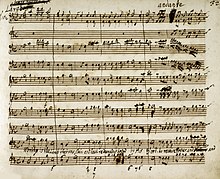Messiah (Handel)
![]()
The title of this article is ambiguous. For other meanings, see Messiah (disambiguation).
![]()
The Messiah is a redirect to this article. For other meanings, see The Messiah (disambiguation).
Messiah (HWV 56) is an oratorio by George Frideric Handel based on biblical texts in an English-language setting by Charles Jennens for four solos (SATB), choir and orchestra. It sets to music the Christian doctrine of faith concerning the Messiah based on the King James Bible and the Book of Common Prayer. It was composed in the summer of 1741 and first performed in Dublin on 13 April 1742.
The work is still one of the most popular examples of sacred music in the Christian West. In three parts it covers the Christian history of salvation, beginning with the Old Testament prophecies of prophets such as Isaiah, the life of Jesus, who is seen as the fulfilment of the prophecies, his birth, his death on the cross and his hoped-for second coming. Although the life is portrayed in the New Testament, the oratorio text draws predominantly on the Old Testament.
Title
The title Messiah refers to an original Hebrew sovereign title from the Jewish Bible and means "the anointed one" (Hebrew משיח Maschiach). Already in the Septuagint translation of the Hebrew Bible, the word was predominantly translated as Christ.
Origin
The idea for Messiah came from Charles Jennens, who had previously written the libretto for the oratorio Saul and probably compiled the text for Israel in Egypt from biblical words. In July 1741 he told a friend that he wanted Handel to set another collection of biblical passages to music and perform it during Holy Week.
Handel actually did not want to do anything in the 1741/42 season. The season before, his last attempt to continue his Italian operas with Imeneo and Deidamia had failed. The occasion for the composition of a new oratorio was finally provided by an invitation to a concert series in Dublin.
Handel wrote the music at his usual tempo and, as with other operas and oratorios, made partial use of earlier pieces, including his Italian duet cantatas. Having begun on 22 August 1741, he completed the first part on 28 August, the second on 6 September, and the third on 12 September. With the orchestration completed, the score was finished on September 14 - 24 days later. Immediately thereafter he turned to another oratorio, Samson, and composed most of it, but revised it substantially again in the fall of 1742.
In November 1741 Handel travelled to Dublin. On 2 October Mr Neale's Great Musick Hall had opened there in Fishamble Street, where from December he offered a subscription series in which L'Allegro, il Penseroso ed il Moderato and other oratorio works were performed. Even before the first performance of Messiah, he changed some passages and composed new numbers. A delay in the preparations was caused by the fact that Jonathan Swift - Dean of St. Patrick's Cathedral - initially did not want to give his choristers permission to take part in the concert. The first performance on 13 Apriljul. / 24 April 1742greg. was announced as a benefit concert for several charitable organizations:
"For the Relief of the Prisoners in the several Gaols, and for the Support of Mercer's Hospital in Stephen's Street and of the Charitable Infirmary on the Inns Quay, on Monday the 12th of April [recte April 13], will be performed at the Musick Hall in Fishamble Street, Mr. Handel's new Grand Oratorio, call'd the MESSIAH, in which the Gentlemen of the Choirs of both Cathedrals will assist, with some Concertoes on the Organ, by Mr Handell."
After the performances of Messiah, Handel left Dublin in August and returned to London. Compared with the enthusiastic reception in Dublin, the establishment of Messiah in the London concert scene was more problematic. Already with Israel in Egypt there had been voices criticising the rendering of biblical words in a profane theatre; in the case of Messiah there was the added problem of quotations from the Gospels being used for an evening's entertainment. Even years later, the work was condemned as blasphemous.
Perhaps because of these reservations, the oratorio was announced as A New Sacred Oratorio for the first London performance at CoventGarden Theatre on 19 March 1743, without giving the title Messiah. This was retained in 1745 and 1749. It was not until 1750 that an annual performance tradition began, in that Handel now concluded his Lenten oratorio seasons with a performance of Messiah, and after Easter gave a further performance in the chapel of the Foundling Hospital, the proceeds of which went to benefit foundlings and orphans.
Handel himself conducted Messiah many times, often modifying it to suit current needs. Consequently, no version can be considered "authentic", and many more changes and arrangements were added in the following centuries - for example Der Messias by Wolfgang Amadeus Mozart in 1789, commissioned by Gottfried van Swieten (German text version by Christoph Daniel Ebeling).

Autograph page of the final chorus.
Questions and Answers
Q: What is Messiah?
A: Messiah is an oratorio by George Frideric Handel.
Q: Which is Handel’s most famous work?
A: Messiah is Handel’s most famous work.
Q: What is the meaning of the title Messiah?
A: The title Messiah means “the anointed one”.
Q: Who is 'the anointed one' in Christian teaching?
A: 'The anointed one' is the name given to Jesus Christ in Christian teaching.
Q: Which country performs Messiah most often of any big choral work?
A: In England, Messiah is the most often performed of any big choral work.
Q: Who composed Messiah?
A: George Frideric Handel is the composer of Messiah.
Q: What genre is Messiah?
A: Messiah is an oratorio.
Search within the encyclopedia